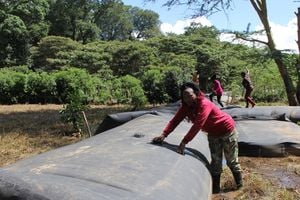UN officials urge Afghan authorities to protect girls’ rights

In this photograph taken on June 7, 2022, Afghan girls study inside a one-classroom private educational centre in Panjwai District of Kandahar. A recent attack on an educational institute in Kabul, killing 53 students, majority young women.
What you need to know:
- UN top officials have mounted pressure on Afghanistan’s de facto authorities to safeguard the rights of women and girls.
- UN Women boss says the September 30, attack on the learning facility is a threat to Afghans' free access to education.
United Nations top officials have mounted pressure on Afghanistan’s de facto authorities to safeguard the rights of women and girls.
A recent attack on an educational institute in Kabul, killing 53 students, majority young women adds up to a series of destructive events against women and girls in the country.
'Confined to their homes, excluded from work, murdered in classrooms — this is what faces Afghan women and girls. With inequality imposed everywhere, nowhere is safe," UN Women Executive Director Sima Bahous said in a statement on October 3.
Women and girls
She observed the September 30, attack on the learning facility as a threat to Afghans' free access to education.
"Education is a fundamental human right and a driving force for the advancement of social, economic, political, and cultural development," she noted.
In response, she called on the de facto authorities "to take immediate action to protect the full rights of Afghan women and girls and to hold perpetrators to account in line with international standards."
Her call reinforced that of UN Secretary-General Antóniow Guterres who on October 1, made a similar appeal.
Street protests
In his tweet, Mr Guterres, who referred to the attack as “heinous attack on an educational centre”, said the current administration in Afghanistan "must protect the rights of all Afghans - regardless of ethnicity or gender - to access education safely and securely."
The women, led by those in academia have also protested the attacks on Shia Muslim minority owing to the fact that the blast occurred in Dasht-e-Barchi neighbourhood of western Kabul, a predominantly Shia Muslim area.
During Monday’s protest on the streets of city of Mazar-i-Sharif, a university professor Zahra Mosawi who was among the marchers, said they had “had enough”.
After the Taliban takeover in August last year, the fundamentalist group has imposed biased policies and regulations, putting a strain on the rights of girls and women.
Human Rights Watch (HRW) wrote in its 2022 World Report that although the Taliban claimed support for the education of girls and women, its policy that disallows girls and women in higher education to study together with boys and men, is repressive.





